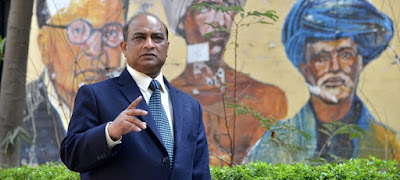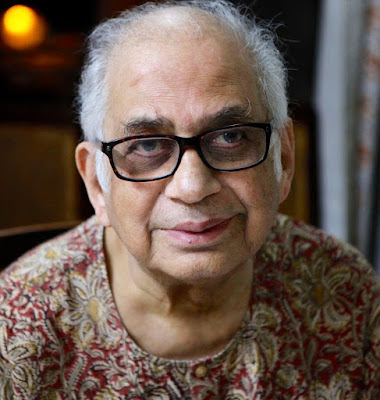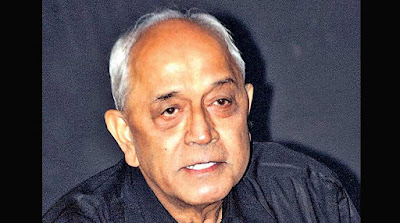Dalit issues
Scroll Staff · Yesterday · 12:19 pm
On Sunday, Vivek Kumar, professor at Jawaharlal Nehru University’s School of Social Sciences, was attacked by activists of the Bharatiya Junta Yuva Morcha as he spoke at Gwalior’s Bal Bhavan. Kumar has done extensive research on Dalit assertions and political mobilisations. The BJYM, which is the youth wing of the Bharatiya Janata Party, called his speech “provocative and anti-national”. Kumar now recounts what he talked about and asks some questions.
“I started with arguing that there are cultural and civilisational aspects of people that I respect, but that they should also respect my culture. I mentioned the Buddha, Birsa Munda, Kanshiram, Savitribhai Phule and others. Over the years, this history has been decimated. It is as if it had never happened. You have suppressed it because you did not debate and discuss it.
I went on to talk about Ambedkar, who said that India was not a nation but a nation in the making. Because it was divided into 6,000 castes. These divides have created animosities.
The idea of the nation is also tied up with self-representation of people in various institutions ‒ the institutions of governance, production and education. They need to be represented in the judiciary, in legislatures, in industries. I’m talking about women, Dalit, tribes, minorities. Where is that self-representation? All institutions have been monopolised by one group. Some people talk of nation building through the trickle-down effect. I say the other way to build the nation is to give people representation.
Some people say that caste has refused to disappear because you have reservation. But I ask which came first, caste or reservation? Some say if you have representation then merit goes down. But tell me, is there a constitutional definition of merit? By merit you usually mean scoring high marks in an examination. You are fifth-generation, seventh-generation, tenth-generation learners. You convert your cultural capital into what you call merit. My parents probably never learnt how to read.
Now they called that 'provocative'. What is provocative here? If there is logical dialogue, you can talk it out. But there is nothing you can say to violence. And that is very dangerous.
Secondly, this was a programme organised by a Dalit group, the Ambedkar Vichar Manch, it was called Babasaheb Ke Sapno Ka Bhartiya Samaj (Indian society as envisioned by Babasaheb), its speakers were Dalit and its audiences were Dalit. How can you deny them that agency? Is that democratic? There seems to be a larger design in Gwalior and in Madhya Pradesh to wipe out Ambedkarism. This government celebrated Ambedkar’s 125th birth anniversary this year. But is that based on any deep understanding of Ambedkar or is it just politics?
As a person of a particular identity, I have a certain duty to my community, to spread knowledge among them. Is that not nation-building?
You construct your own idea of nationalism and use it to selectively target those who don’t conform to it. You brand people anti-national as it suits you. Sometimes you kill in the name of the cow, sometimes it is because of love jihad, sometimes it is because you have decided to call JNU-ites anti-national. These are dangerous constructions of nationalism.
How can you brand a university which has so much diversity as any one thing? There are students from so many different places and communities and so many different groups. Is the ABVP [Akhil Bhartiya Vidyarthi Parishad] also anti-national? It has given several student councillors to JNU.
General [GD] Bakshi keeps saying [during his frequent appearances on the Times Now channel] that we don’t commemorate the deaths of soldiers. But have the jawans themselves ever spoken on television? Who has given General Bakshi the right to speak for them? Is his nationalism representative of them? It is the same for the students. Can any one opinion represent a diverse university?
We have produced civil servants and academics who are contributing to the production of knowledge, good actors and NGO workers. The former security advisor, Shiv Shankar Menon was our student. We have contributed directly to every sphere of society. What are you gaining internationally by calling us anti-national?”
As told to Ipsita Chakravarty.
We welcome your comments at letters@scroll.in
Scroll Staff · Yesterday · 12:19 pm
On Sunday, Vivek Kumar, professor at Jawaharlal Nehru University’s School of Social Sciences, was attacked by activists of the Bharatiya Junta Yuva Morcha as he spoke at Gwalior’s Bal Bhavan. Kumar has done extensive research on Dalit assertions and political mobilisations. The BJYM, which is the youth wing of the Bharatiya Janata Party, called his speech “provocative and anti-national”. Kumar now recounts what he talked about and asks some questions.
“I started with arguing that there are cultural and civilisational aspects of people that I respect, but that they should also respect my culture. I mentioned the Buddha, Birsa Munda, Kanshiram, Savitribhai Phule and others. Over the years, this history has been decimated. It is as if it had never happened. You have suppressed it because you did not debate and discuss it.
I went on to talk about Ambedkar, who said that India was not a nation but a nation in the making. Because it was divided into 6,000 castes. These divides have created animosities.
The idea of the nation is also tied up with self-representation of people in various institutions ‒ the institutions of governance, production and education. They need to be represented in the judiciary, in legislatures, in industries. I’m talking about women, Dalit, tribes, minorities. Where is that self-representation? All institutions have been monopolised by one group. Some people talk of nation building through the trickle-down effect. I say the other way to build the nation is to give people representation.
Some people say that caste has refused to disappear because you have reservation. But I ask which came first, caste or reservation? Some say if you have representation then merit goes down. But tell me, is there a constitutional definition of merit? By merit you usually mean scoring high marks in an examination. You are fifth-generation, seventh-generation, tenth-generation learners. You convert your cultural capital into what you call merit. My parents probably never learnt how to read.
Now they called that 'provocative'. What is provocative here? If there is logical dialogue, you can talk it out. But there is nothing you can say to violence. And that is very dangerous.
Secondly, this was a programme organised by a Dalit group, the Ambedkar Vichar Manch, it was called Babasaheb Ke Sapno Ka Bhartiya Samaj (Indian society as envisioned by Babasaheb), its speakers were Dalit and its audiences were Dalit. How can you deny them that agency? Is that democratic? There seems to be a larger design in Gwalior and in Madhya Pradesh to wipe out Ambedkarism. This government celebrated Ambedkar’s 125th birth anniversary this year. But is that based on any deep understanding of Ambedkar or is it just politics?
As a person of a particular identity, I have a certain duty to my community, to spread knowledge among them. Is that not nation-building?
You construct your own idea of nationalism and use it to selectively target those who don’t conform to it. You brand people anti-national as it suits you. Sometimes you kill in the name of the cow, sometimes it is because of love jihad, sometimes it is because you have decided to call JNU-ites anti-national. These are dangerous constructions of nationalism.
How can you brand a university which has so much diversity as any one thing? There are students from so many different places and communities and so many different groups. Is the ABVP [Akhil Bhartiya Vidyarthi Parishad] also anti-national? It has given several student councillors to JNU.
General [GD] Bakshi keeps saying [during his frequent appearances on the Times Now channel] that we don’t commemorate the deaths of soldiers. But have the jawans themselves ever spoken on television? Who has given General Bakshi the right to speak for them? Is his nationalism representative of them? It is the same for the students. Can any one opinion represent a diverse university?
We have produced civil servants and academics who are contributing to the production of knowledge, good actors and NGO workers. The former security advisor, Shiv Shankar Menon was our student. We have contributed directly to every sphere of society. What are you gaining internationally by calling us anti-national?”
As told to Ipsita Chakravarty.
We welcome your comments at letters@scroll.in
Source: scrollin





